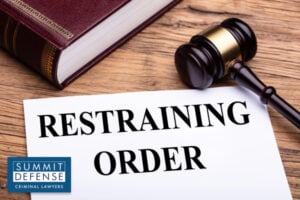 A domestic violence conviction can change your life in many ways. Even one domestic violence incident can lead to serious criminal charges, especially if someone gets hurt or if there are prior domestic violence convictions on your record. The legal system takes these cases seriously. Courts want to protect alleged victims, especially when they are family members, former spouses, or people in close personal relationships with the accused.
A domestic violence conviction can change your life in many ways. Even one domestic violence incident can lead to serious criminal charges, especially if someone gets hurt or if there are prior domestic violence convictions on your record. The legal system takes these cases seriously. Courts want to protect alleged victims, especially when they are family members, former spouses, or people in close personal relationships with the accused.
Summit Defense Criminal Lawyers helps people who are facing domestic violence charges by providing strong legal defense. The law is strict, but having the right support can make a big difference in your case.
From helping you understand what type of domestic violence charges you’re facing to building a defense that challenges the facts, we work hard to protect your rights and your future. Whether it’s a misdemeanor or felony conviction, we’ll help you fight back.
Misdemeanor vs. Felony Domestic Violence
When someone is charged with domestic violence, the law separates the charges into either misdemeanors or felonies, depending on what happened and how serious the injuries were. The difference between a misdemeanor domestic violence conviction and a felony conviction usually depends on whether the alleged victim was seriously injured, if any deadly weapon was used, or if the person accused has prior convictions on their criminal history.
The court looks at the full situation, including the amount of harm caused, the relationship between the people involved, and any past issues of abusive behavior or violent conduct. A minor domestic violence incident that doesn’t cause serious bodily injury might result in a misdemeanor, but more severe situations (especially those that involve aggravating factors) can lead to felony domestic violence charges and possibly a long prison sentence.
What Determines the Severity of Charges?
Courts decide how to classify domestic violence offenses by reviewing several factors. These include how much bodily harm or physical injury the alleged victim suffered, whether the accused used a deadly weapon, whether there’s a pattern of domestic violence, and whether any former spouse or household member was involved.
Also, a person’s criminal history plays a big role; those with prior domestic violence convictions are more likely to face felony charges.
Common Misdemeanor Offenses
- Domestic battery: Any harmful or unwanted physical contact against someone in a domestic relationship that doesn’t cause serious injury.
- Simple assault: Threatening or attempting to hurt someone, even without making physical contact.
- Violating a protective order: Breaking the rules set by the court to stay away from the alleged victim or other family members.
- Emotional distress caused by abuse: Acts that lead to stress or fear, even without physical harm.
Common Felony Offenses
- Corporal injury on a spouse or cohabitant: Causing physical harm to a partner or someone you live with, especially if the injury is visible.
- Aggravated assault: Attacking someone with a weapon or causing serious bodily injury that may need medical care.
- Sexual assault: Any non-consensual sexual act committed against a partner, spouse, or someone in a domestic relationship.
- Criminal threats: Threatening serious violence that causes fear, especially when the alleged victim believes they’re in real danger.
Criminal Penalties for Domestic Violence Convictions
 When someone is found guilty of domestic violence, the court can give many types of punishment. What a person receives depends on what happened, the severity of the harm, and whether they have prior convictions.
When someone is found guilty of domestic violence, the court can give many types of punishment. What a person receives depends on what happened, the severity of the harm, and whether they have prior convictions.
The court may impose jail time, order someone to pay money or require them to follow specific rules for an extended period. These punishments are meant to stop future violence and protect family members and others involved in the case.
Jail or Prison Time
If the court finds you guilty, you might have to go to county jail or even state prison. For a misdemeanor, you could spend up to one year in jail. But if the charge is a felony domestic violence case, you might face up to five years or even more in prison, especially if someone was badly injured or a deadly weapon was used. A longer time is also possible if you already have prior domestic violence convictions.
Fines and Restitution
You may also have to pay fines to the court, which can cost thousands of dollars. In some cases, the court might also order restitution, which means you pay money to the alleged victim to help cover medical bills, lost wages, or other costs caused by the domestic violence incident. These fines are serious and are part of the full punishment.
For example, under California Penal Code 243(e)(1), which covers misdemeanor domestic battery, you could face a fine of up to $2,000, even if there were no visible injuries.
If you’re charged under Penal Code 273.5, which applies when there is a visible injury or corporal injury to a spouse or partner, the court can impose fines of up to $6,000, and even more if there are prior convictions.
In both cases, the court may also require restitution payments to cover costs like hospital visits, counseling, or missed workdays.
Probation or Parole Terms
Sometimes, the judge will let a person stay out of jail if they agree to follow strict rules, called probation. These rules may include staying away from the alleged victim, going to anger management classes, or not using drugs or alcohol.
For more serious cases, a person may be granted parole after serving time in prison, and they must also follow specific rules or risk being returned to jail.
Additional Court-Ordered Consequences
Even if someone does not go to jail, the court can still order more actions to make sure they understand how serious domestic violence is. These extra steps are intended to prevent future harm, keep family members safe, and promote better learning behavior. These rules often last for months or even years and must be followed closely.
Mandatory Domestic Violence Classes or Batterer’s Programs
One common rule is attending special classes for people who have been charged with domestic violence. These are sometimes referred to as batterer’s programs. In these classes, people learn why abusive behavior is wrong and how to better control anger.
The program may last several weeks, and missing classes can lead to more serious consequences, such as being sent back to court or even jail.
Protective or Restraining Orders
The judge may also order a protective order, also known as a restraining order, to keep the accused person away from the alleged victim. This means they must not go near the victim’s home, job, or school. Breaking this rule can lead to more charges and more jail time. The court takes these orders very seriously to make sure people feel safe.
Community Service or Work Release Programs
Instead of jail, some people are told to do community service. This means they must help in the community by picking up trash, helping in public places, or doing other work. In some cases, the court may also allow work release programs, where a person can go to work during the day but must return to a supervised place, like a jail or program facility, at night.
Long-Term Consequences of a Domestic Violence Conviction
 A domestic violence conviction does not just affect your life right after court. It can cause problems for many years after the case is over. These long-term issues can affect your job, your rights, and even your ability to stay with your children or live in the U.S. if you are not a citizen.
A domestic violence conviction does not just affect your life right after court. It can cause problems for many years after the case is over. These long-term issues can affect your job, your rights, and even your ability to stay with your children or live in the U.S. if you are not a citizen.
1. Permanent criminal record: Once you are convicted of a crime, it usually stays on your criminal record forever. This means schools, employers, and landlords can see it if they check your background. A domestic violence crime on your record can make life harder for a long time, even if it was just one mistake or a first offense.
2. Loss of gun rights: If you are found guilty of domestic violence, you will likely lose the right to own or carry a gun. Federal law does not allow people with certain violent crimes, especially those involving family members, to have firearms. This applies even if the case was not a felony conviction.
3. Effects on employment and professional licenses: Having a domestic violence conviction can make it much harder to get a job, especially in careers that involve working with people, public safety, or health care. Some people may even lose their professional licenses, such as nurses, teachers, or security workers. Employers may worry about violent conduct and may choose not to hire someone with a record of this behavior.
4. Immigration consequences for non-citizens: For people who are not U.S. citizens, a domestic violence conviction can cause serious immigration problems. It may lead to deportation, denial of green cards, or blocking a path to citizenship. Even if it is a misdemeanor, it can still affect your future in the United States.
5. Child custody and visitation impacts: A person with a domestic violence record may have trouble getting or keeping custody of their children. The court may say that a person who harms someone in their household is not safe to have around their kids. This can lead to limited visits, supervised time, or even full custody given to the other parent.
Can Penalties Be Reduced or Avoided?
In some domestic violence cases, the court may allow ways to lessen the punishment, especially if it is your first time getting in trouble. If you show that you are willing to improve, take classes, or follow the court’s rules, you may be able to avoid jail or reduce the charges against you.
First-Time Offender Programs or Diversion
If this is your first time facing domestic violence charges, the court might offer a diversion program. This means you complete certain tasks, such as counseling or classes, and if you complete everything correctly, your charges may be dropped or dismissed. These programs provide individuals with a second chance without adding a criminal conviction to their records.
Plea Deals and Reduced Charges
Your defense attorney may work out a plea deal with the court. That means you agree to plead guilty to a less serious crime, and in return, you may get a lighter sentence or avoid jail time. Plea deals can help in cases where the evidence is strong, but you still want a better outcome.
Successful Completion of Probation or Counseling
If the judge puts you on probation or asks you to take domestic violence classes, finishing these programs on time and without problems can help you stay out of jail. It also shows the court you are serious about changing and avoiding future trouble.
What Happens if You Violate a Restraining Order?
 If a protective order or restraining order is in place, you must follow every rule the court gave you. If you break that order (even by calling or texting the alleged victim), there will be more legal trouble. The court will treat the violation as a new crime and punish you more.
If a protective order or restraining order is in place, you must follow every rule the court gave you. If you break that order (even by calling or texting the alleged victim), there will be more legal trouble. The court will treat the violation as a new crime and punish you more.
Additional Criminal Charges
Breaking a restraining order can lead to new criminal charges. Even if there was no violence during the violation, just the act of contacting the person could be enough to get you arrested again. This adds to your criminal record and makes the case harder to fight.
Increased Jail Time and Fines
If you break the order, the judge may give you more jail time or higher fines, especially if the violation puts someone in danger. Judges take these matters seriously because they are meant to protect victims from more harm.
Probation Revocation or Sentence Enhancements
If you were already on probation, breaking a restraining order may cause the judge to cancel your probation and send you straight to jail. In some cases, the judge can also add more time or extra rules to your punishment, called sentence enhancement.
FAQs
1. What Counts as an Act of Domestic Violence?
An act of domestic violence can include physical abuse, threats, or even emotional harm toward a spouse, ex, or someone you live with. Hitting, pushing, or yelling during an argument can all be considered domestic violence, depending on what happened and who was involved.
2. What Are the Penalties for Domestic Violence Criminal Charges?
Domestic violence penalties can include jail, fines, restraining orders, or mandatory anger management classes. In many domestic violence cases, the court also adds rules that affect where you can go or who you can talk to. You may also lose the right to own or possess firearms after a domestic charges conviction.
3. Can I Use Self-Defense if I’m Accused of Domestic Violence?
Yes. If you were trying to protect yourself from harm, your lawyer might argue self-defense. To win with this defense, your criminal defense lawyer must show that you were in real danger and had no other way to stop the threat.
4. Do I Need a Lawyer if I Think the Case Is Weak?
Even if you think the domestic violence allegation is false or unfair, it’s smart to work with an experienced criminal defense attorney. They understand how to handle legal matters, find reasonable doubt, and protect your rights. A weak case still needs a strong defense.
5. How Will a Conviction Affect My Life?
A conviction for a criminal offense like domestic violence can hurt your ability to find work, rent a home, or see your children. It may also damage family relationships and limit your rights, such as the right to possess firearms. The consequences go far beyond just going to court.


 If you’re facing domestic violence charges, it’s normal to feel scared, confused or even hopeless. But you don’t have to go through it alone.
If you’re facing domestic violence charges, it’s normal to feel scared, confused or even hopeless. But you don’t have to go through it alone. 








